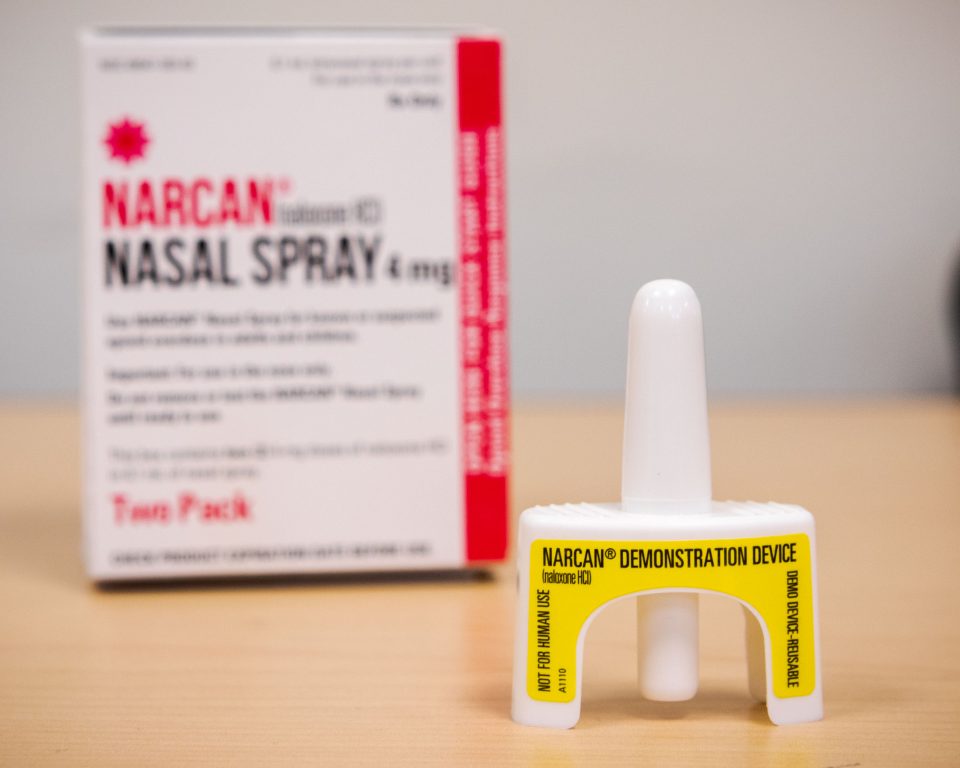Narcan, Fentanyl Testing Strip Vending Machines Planned for Milwaukee
New strategy designed to address record overdose deaths.

Narcan nasal spray. (CC BY 2.0).
By next summer, residents of Milwaukee County will begin seeing signs of a new harm reduction and prevention strategy, adopted as drug-related deaths in the area continue to rise. Plans are underway to begin deploying harm reduction vending machines to neighborhoods afflicted by a wave of drug-related deaths. The vending machines will be stocked with the anti-overdose medication Narcan, fentanyl testing strips and other supplies — all available free of charge.
“All of the literature around prevention of people dying from overdoses basically says that harm reduction is a big piece of that,” Mike Lappen, administrator at the county’s Behavioral Health Services (BHS), tells Wisconsin Examiner. Narcan, recently fentanyl test strips and safe injection supplies are key to helping people who are using drugs stay alive “while they’re in that stage where they may not be quite ready to recover,” says Lappen. “But if we help them, they’re connected to us, then when they do elect to seek treatment and try to stop using, then at least they have a relationship with us.”
In November, at a county harm reduction coordination meeting outlining efforts to curb overdoses, health department officials gave a presentation on the vending machines. The next phase will come in December, when HRI Vending will customize 11 vending machines and deliver them to the Marcia P. Coggs Building.
Last year, 644 people died of a drug-related cause in Milwaukee County. The figure broke a new record, and eclipsed the last record number of 544 which had been set the prior year. Fentanyl is largely driving the surge of deaths regardless of community, demographic, political affiliation and other factors that divide people in one of America’s most segregated cities. Ever year for the last five years Milwaukee County has set and broken records for fatal overdoses. Now, drug-related deaths outpace car accidents and homicides combined, two of the most high-profile issues in Milwaukee.
During 2021, roughly 80% of the drug-related deaths that occurred in Milwaukee County involved some form of fentanyl. Deaths related to cocaine, methamphetamine and counterfeit prescription pills have continued to rise. Deaths solely caused by heroin, on the other hand, have dropped dramatically in Milwaukee County.
Strengthening and coordinating the landscape of treatment and harm reduction services in Milwaukee County is a crucial step. The harm reduction vending machines are a small part of a strategy the county is continuing to develop. “Our vending machines will be right where they need to be,” Lappen tells Wisconsin Examiner. “They’ll be in key neighborhoods and they will reflect that reduction in barriers to access that we are really working for.” Although some areas do experience regular clusters of overdoses, generally speaking the entire county is affected by these deaths. From north to south, east to west, urban and suburban alike, people continue to die from drug overdose.
Several county supervisors are already on board with deploying the vending machines. “It’s a totally commonsense approach,” Sup. Ryan Clancy tells Wisconsin Examiner. “Having harm-reduction implements available where they need it, when they need it, and without a lot of obstruction. I mean, not having to talk to anybody or register and everything else I think is a big deal. It’s been used in other places really successfully, I’m really glad we’re embracing that.”
Stigma is something the program will inevitably face. Many residents may not be excited about a harm reduction vending machine being deployed in their neighborhood, thinking it either encourages drug use or that the problem only exists elsewhere. Lappen has been in public meetings where people argued their neighborhood had no drug problem, only to be proven wrong by data. Wasserman supports other strategies including needle exchange, which have been around for years. Clancy also supports the idea of safe injection sites, the first of which was opened in New York.
Sup. Dyango Zerpa tells Wisconsin Examiner that as the vending machine plan takes shape, the safety of the public will be paramount. Planning is underway to ensure that the vending machines will be secured in case people try to dump the entire machine and that they will be well monitored.
Drug overdose and abuse, Zerpa says, is one of the top issues among residents of his district. “There are neighborhood groups that go out with gloves simply just to pick up the needles,” said Zerpa. “It is such a pervasive problem in our neighborhood. And the amount of deaths in my district are the highest in Milwaukee County. And if it’s the highest in Milwaukee County, then it might be the highest in the state.”
Zerpa adds, “the Medical Examiner’s Office is overloaded with these overdose deaths and a lot of them come from our district.”
By January, the harm reduction vending machine request application will be shared with businesses, nonprofits, religious organizations and public buildings for bids. Agencies will be selected based on their ability to meet basic requirements, such as available space and their relationships with the surrounding communities. The following month, the vending machines will be delivered to the selected agencies. Each agency will train on how to use the machines, as well as how restocking procedures work. Between February and May, community members will canvass neighborhoods with fliers, resources, and vending machine maps. Live demonstrations will also occur as the vending machines get closer to full deployment.
Vending machines with Narcan, fentanyl testing strips could come to Milwaukee was originally published by the Wisconsin Examiner.
More about the Opioid Crisis
- Attorney General Kaul Announces Consent Judgment with Kroger Over Opioid Crisis - Wisconsin Department of Justice - Mar 21st, 2025
- Baldwin Votes to Strengthen Penalties, Step Up Enforcement Around Deadly Fentanyl - U.S. Sen. Tammy Baldwin - Mar 17th, 2025
- Wisconsin Communities Get Millions From Opioid Settlement as Deaths Decline - Evan Casey - Mar 1st, 2025
- MKE County: County Creates Easy Public Access To Overdose Data - Graham Kilmer - Feb 18th, 2025
- Milwaukee County Executive David Crowley and the Office of Emergency Management Launch New Overdose Dashboard - County Executive David Crowley - Feb 18th, 2025
- Fitzgerald Advances Legislation to Fight Opioid Epidemic - U.S. Rep. Scott Fitzgerald - Feb 6th, 2025
- Milwaukee Is Losing a Generation of Black Men To Drug Crisis - Edgar Mendez and Devin Blake - Jan 31st, 2025
- Milwaukee County’s Overdose Deaths Declined For Second Straight Year - Evan Casey - Jan 27th, 2025
- MKE County: United Community Center Awarded Drug Company Money For Addiction Treatment - Graham Kilmer - Jan 12th, 2025
- DHS Provides Update on Distribution of Latest Opioid Settlement Funds - Wisconsin Department of Health Services - Jan 9th, 2025
Read more about Opioid Crisis here
MKE County
-
J.D. Vance Plays Up Working Class Roots, Populist Politics in RNC Speech
 Jul 17th, 2024 by Graham Kilmer
Jul 17th, 2024 by Graham Kilmer
-
Ron Johnson Says Free-Market Principles Could Fix Education
 Jul 17th, 2024 by Graham Kilmer
Jul 17th, 2024 by Graham Kilmer
-
RNC Will Cause Some County Services To Be Moved to Wauwatosa
 Jul 12th, 2024 by Graham Kilmer
Jul 12th, 2024 by Graham Kilmer





















